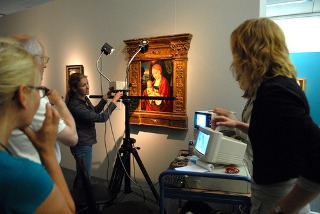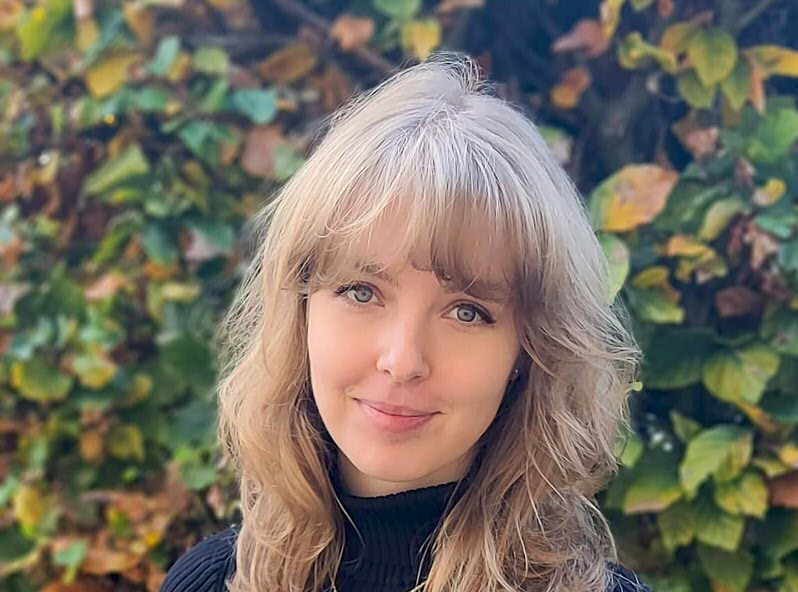
Do you want to be well prepared for a career in the world of the Visual Arts? The Master Program in Art History and Curatorial Studies offers all the knowledge and expertise that you need.
The programme combines a rigorous, research driven curriculum with hands-on experience in curatorial practice, working closely together with stakeholders in museums, galleries, alternative art spaces, and heritage institutions. It offers courses on early modern, modern and contemporary art, while also highlighting transhistorical and transcultural means. The program includes courses on artistic research in collaboration with the art academy, and explores contemporary conservation issues with a view to eco-critical approaches in art history. All students will go on an excursion to a major European city (Berlin, Paris, Rome or Venice). Next to the MA thesis, small scale research tutorials allow students to work with individual professors, developing and strengthening their professional profile. On top of the programme, students can participate in summer schools, Erasmus exchange modules, and research activities, such as workshops and conferences offered by the faculty’s research institutes.
Our international staff includes experts in medieval, early modern, and modern & contemporary art, Chinese, South-American, and African heritage and museum studies, artistic research, and visual & material culture. All course modules are taught in close contact with museums, curators, artists and other professionals in the field and involve on-site elements.
With completing the one-year Master’s track students obtain an internationally well perceived degree and springboard for future careers. Students particularly interested in research and an academic career, may apply for the Research Master Program after the first semester (upon consultation with the supervisors). Students particularly interested in curatorial practices may pursue a six months internship after the completion of all coursework and the thesis. The curatorial internship is subject to a selection after the first semester of the MA track. Higher than average scores and strong collaborative skills are a requirement for the internship.
Sign up now for the Master's week from 24-28 March!Our programme offers a placement in a museum in the Netherlands or abroad. The knowledge and experience acquired during the internship significantly strengthen a student's chances of obtaining a curatorial position.
The programme offers a unique combination of rigorous art-historical academic training and practical experience. The director of the Groninger Museum teaches a course in our program and we work closely with other museums. Our programme also includes an excursion abroad and a wide range of on-site visits to collections and arts/cultural institutions throughout the Netherlands.
The master-track in Art History has three specializations: Early Modern Art, Modern and Contemporary Art, and Curatorial Studies. Students specialize in one of these three tracks. Specific qualifications are required for Curatorial Studies.
| Semesters | ||||||
|---|---|---|---|---|---|---|
| CoursesCourse Catalog > | 1a | 1b | 2a | 2b | 3a | 3b |
| Art History Now: Theory, Method, Historiography (10 EC) | ||||||
| Collections & Artefacts (10 EC, optional) | ||||||
| Media, Materials, Makers: Art and/as Research (10 EC, optional) | ||||||
| Museums: The Making-of (10 EC, optional) | ||||||
| Excursion (5 EC) | ||||||
| Master Thesis (20 EC) | ||||||
| Tutorial (5 EC) | ||||||
| Museum Placement (30 EC) | ||||||
The first semester consists of one required course, Art History Now, and two courses that complement the student's specialization. In the second semester, the Early Modern and Modern and Contemporary Art students write a thesis of 15 EC and complete a placement of 10 EC. The Curatorial students write a thesis of 20 EC and follow a tutorial of 5 EC. These students conclude their studies in the third semester with a placement of 30 EC.
All students go on an excursion abroad in the second semester.
| Programme options |
|---|
| Master's Placement (specialization) This Master's track includes an optional work placement for which you are awarded ECTS credit points. It is your responsibility to find a placement yourself, but the Office for Student Affairs can offer help with this where necessary. |
All students have the option to study abroad.
| Specific requirements | More information |
|---|---|
| previous education |
Students with a Bachelor's degree in Art History and Arts. Culture and Media (incl. Visual Art programme) are directly admissible to this Master's track. University of Groningen students with a BA in:
with a Faculty Minor (30 ECTS) in History in Art, Architecture and Landscape are also eligible for admission to this Master's track only via the Admission Board. Professionals and students with a background in a related field are welcome to apply to the track. The Admission Board will assess whether your educational/academic background meets the specific track requirements, and will consider the level and curriculum of your previous studies. |
| language test |
Additional requirements English: A VWO diploma or a subject certificate for VWO English (mark 6 or higher), minimum requirement of TOEFL iBT 90 (with a minimum of 21 on all items), or IELTS 6.5 (with a minimum of 6 on all items). Cambridge C1 Advanced or C2 Proficiency. |
| other admission requirements |
Selection for the Curatorial Programme takes place at the end of the first semester among students of the master's track in Art History. For more information contact Joost Keizer (joost.keizer rug.nl) |
| Study programme | Organization | Transition |
|---|---|---|
| Art History | University of Groningen | No additional requirements |
| Study programme | Organization | Transition |
|---|---|---|
| Art History | All Research universities | No additional requirements |
Please use this step-by-step guide for more information regarding your eligibility and your specific application procedure.
After you complete your application, the Admissions Board will assess whether your educational/academic background meets the specific programme requirements, and will consider the level and curriculum of your previous studies.
The Admissions Board will then determine whether:
| Type of student | Deadline | Start course |
|---|---|---|
| Dutch students | 15 August 2025 | 01 September 2025 |
| 15 August 2026 | 01 September 2026 | |
| EU/EEA students | 01 May 2025 | 01 September 2025 |
| 01 May 2026 | 01 September 2026 | |
| non-EU/EEA students | 01 May 2025 | 01 September 2025 |
| 01 May 2026 | 01 September 2026 |
| Specific requirements | More information |
|---|---|
| previous education |
Students with a Bachelor's degree in Art History and Arts. Culture and Media (incl. Visual Art programme) are directly admissible to this Master's track. University of Groningen students with a BA in:
with a Faculty Minor (30 ECTS) in History in Art, Architecture and Landscape are also eligible for admission to this Master's track only via the Admission Board. Professionals and students with a background in a related field are welcome to apply to the track. The Admission Board will assess whether your educational/academic background meets the specific track requirements, and will consider the level and curriculum of your previous studies. |
| language test |
Additional requirements English: A VWO diploma or a subject certificate for VWO English (mark 6 or higher), minimum requirement of TOEFL iBT 90 (with a minimum of 21 on all items), or IELTS 6.5 (with a minimum of 6 on all items). Cambridge C1 Advanced or C2 Proficiency. |
| other admission requirements |
Selection for the Curatorial Programme takes place at the end of the first semester among students of the master's track in Art History. For more information contact Joost Keizer (joost.keizer rug.nl) |
Please use this step-by-step guide for more information regarding your eligibility and your specific application procedure.
After you complete your application, the Admissions Board will assess whether your educational/academic background meets the specific programme requirements, and will consider the level and curriculum of your previous studies.
The Admissions Board will then determine whether:
| Type of student | Deadline | Start course |
|---|---|---|
| Dutch students | 15 August 2025 | 01 September 2025 |
| 15 August 2026 | 01 September 2026 | |
| EU/EEA students | 01 May 2025 | 01 September 2025 |
| 01 May 2026 | 01 September 2026 | |
| non-EU/EEA students | 01 May 2025 | 01 September 2025 |
| 01 May 2026 | 01 September 2026 |
The experience you gain and the network you cast during an internship, improves your position in the job market. Therefore, you are more qualified than other students of the Master's track Art History for a future in curatorial studies. Our attention to your individual interests, the rigorous courses, and the internship, prepare you for a career as museum curator or educator. Our programme also caters to the profession of the independent curator.

Conducting research in the field of Art History is one of the most wonderful challenges you can face as a Master's student. In nearly all art history related jobs, research is an important aspect of your work, whether you are a curator in a print room or a policy officer at a municipality, employers will call upon your research skills and critical thinking. During your Master's, you will learn what art historical research entails, how you can conduct it yourself, and how you can apply these skills to the benefit of society. The field of research is extensive, including, analyzing and interpreting works of art, focusing on the technique of the artist and material properties of the artwork, the museological and social context -in other words, the art world-, theoretical approaches and archival research. Ideally, your research alligns with our staff's specializations, but this does not have to be the case. Our staff members will be able to teach and supervize you because of their great research background. Additionally, our staff members have numerous international contacts in a range of fields, therefore it would be possible to study to conduct reasearch abroad, as the curriculum also permits.
The most important research you will conduct during your studies is your Master's thesis, which will be written in collaboration with the museum where you follow the internship. This could enable you to research the methodology and techniques used in the creation of certain artworks. In addition, the museum will grant you access to source materials that are not or barely readily available. You have the opportunity to take a look at depots and to collect information that is not (yet) available to the public. I would also be possible to research the museum itself, for example by evaluating their exhibition policies.

Hi! My name is Maryon, and I'm currently studying in the Master's programme for Art History & Curatorial Studies. I currently live in Akkrum, close to Heerenveen, so whenever we have class, I commute with the train about an hour and a half each way to Groningen. While the travel can sometimes be a bit of a hassle, I've found it also gives me extra dedicated time to prepare for class.
Are you interested in a research oriented career? Take a look at our Research Master Programmes in the field of Arts and Culture.